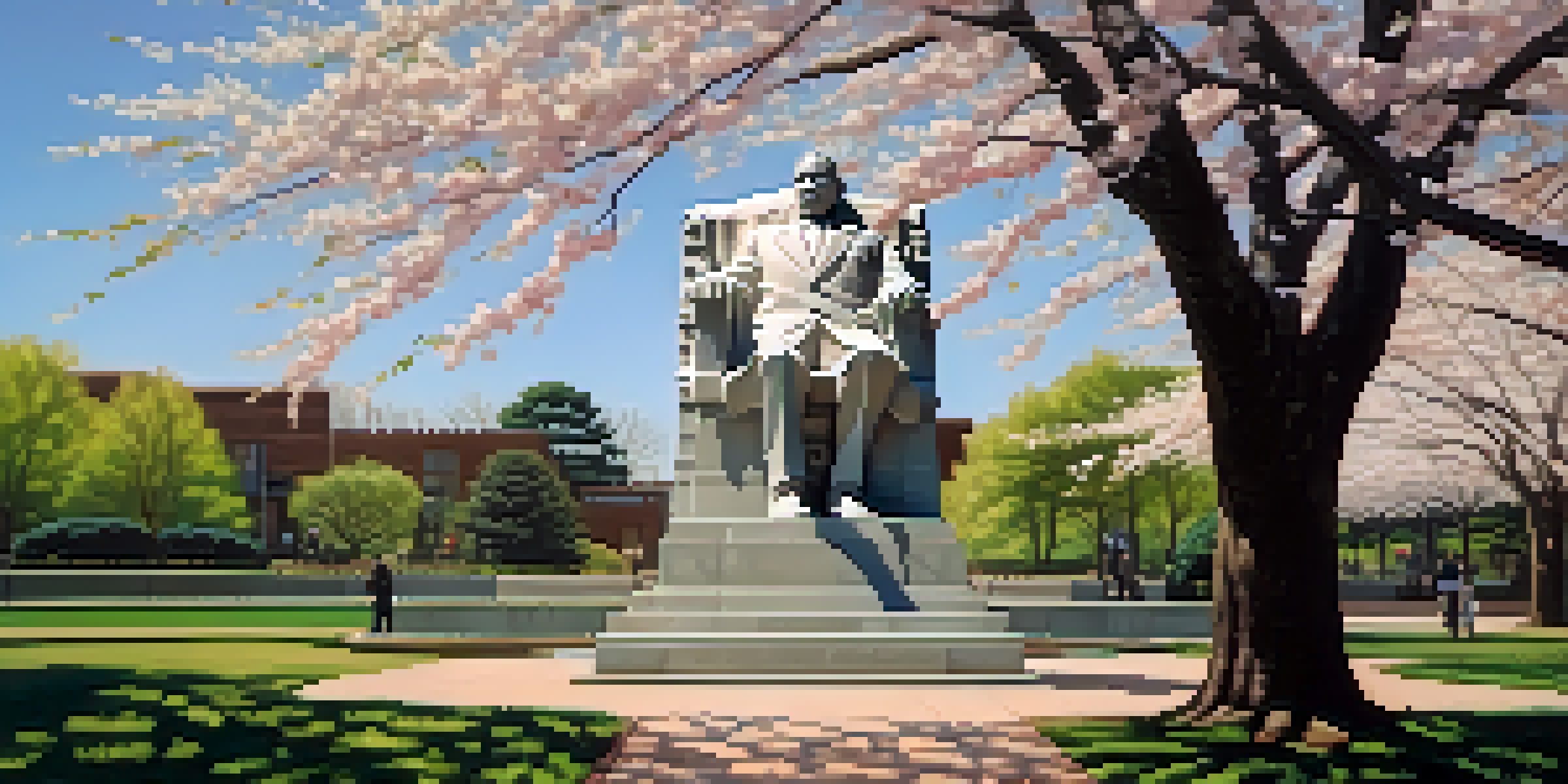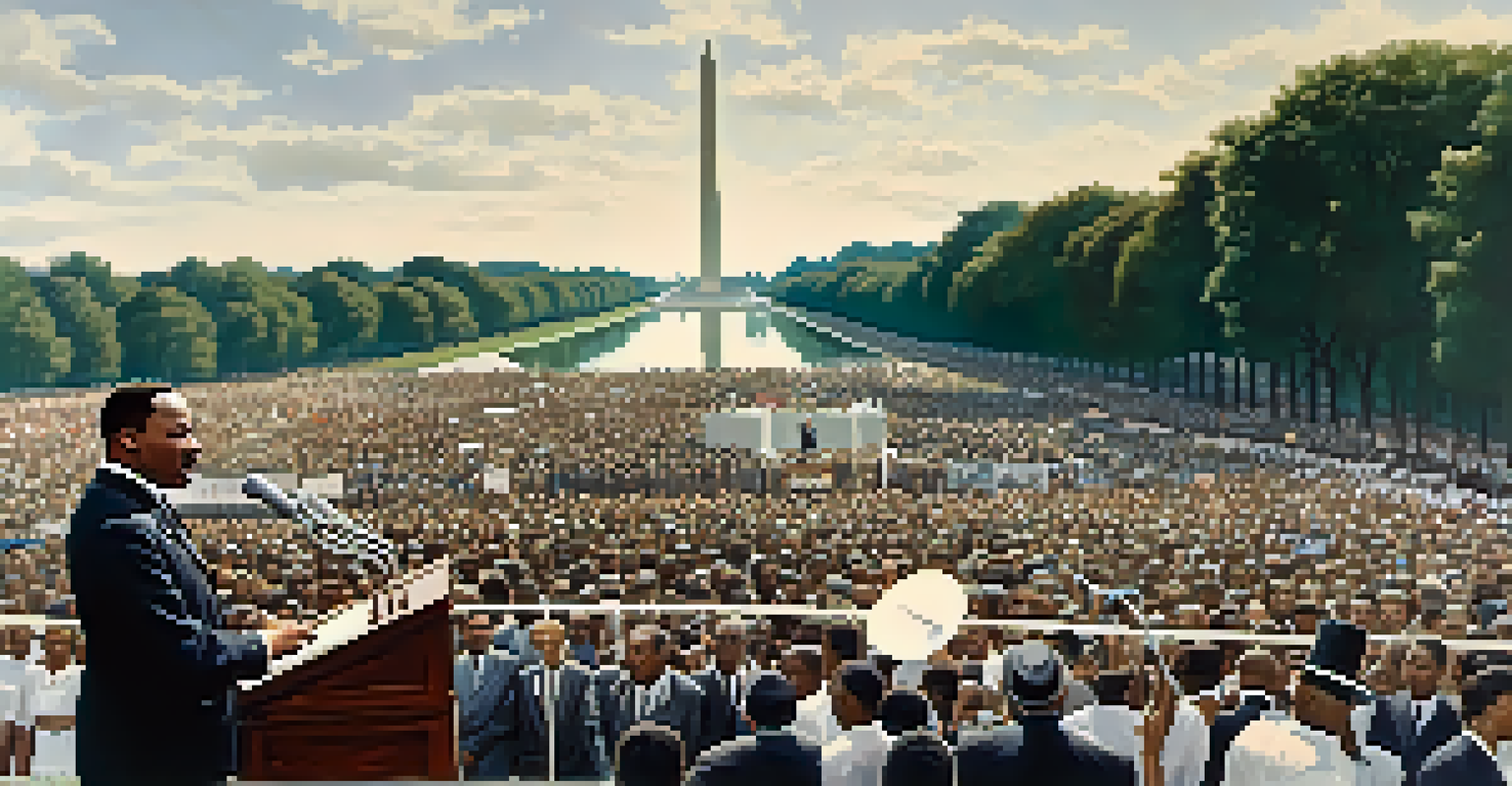Martin Luther King Jr.: Atlanta's Legacy of Leadership

The Roots of Leadership: King's Early Life in Atlanta
Martin Luther King Jr. was born in Atlanta, Georgia, on January 15, 1929. Growing up in a deeply segregated southern city, he was profoundly influenced by his family and community. His father, Martin Luther King Sr., was a prominent pastor, instilling in him values of faith and social justice. These early experiences laid the groundwork for his future as a leader in the Civil Rights Movement.
Injustice anywhere is a threat to justice everywhere.
Atlanta was not just King's hometown; it was a crucible where his ideas about justice and equality began to take shape. Attending Morehouse College, he was exposed to various philosophies, including those of Gandhi, which would later influence his approach to nonviolent protest. This blend of local heritage and global thought helped him develop a unique perspective on leadership.
As King navigated his formative years, he witnessed firsthand the struggles faced by African Americans in the South. These experiences fueled his passion for change, motivating him to become a voice for the voiceless. His early life in Atlanta was pivotal in shaping his vision, ultimately leading him to spearhead a movement that would transform America.
The Atlanta Community: A Supportive Network for Change
The Atlanta community played a significant role in nurturing King's leadership. Local churches, particularly the Ebenezer Baptist Church where he preached, became hubs for organizing and mobilizing efforts for civil rights. This sense of community support was crucial as it provided a platform for King's message to resonate and reach wider audiences.

In addition to church support, King collaborated with various local leaders and organizations. Figures like Ralph Abernathy and Andrew Young formed a strong coalition that worked tirelessly for social justice. Their collective efforts showcased the power of unity, demonstrating that change could be achieved through collaboration and shared vision.
King's Early Life Shaped Leadership
Martin Luther King Jr.'s upbringing in Atlanta, influenced by his family and community, laid the foundation for his future role in the Civil Rights Movement.
Moreover, the Atlanta University Center, which comprised several historically black colleges, offered a fertile ground for activism. Students and faculty alike engaged in intellectual discussions about race and equality, further empowering King and his allies. This synergistic environment was instrumental in shaping strategies that would later be employed in more extensive campaigns across the nation.
Nonviolent Resistance: King's Philosophy and Tactics
One of the hallmarks of Martin Luther King Jr.'s leadership was his commitment to nonviolence. Drawing inspiration from Mahatma Gandhi, King believed that peaceful protest could effectively challenge systemic injustice. This philosophy not only set him apart from other civil rights leaders but also attracted a diverse following willing to join the cause.
The time is always right to do what is right.
In Atlanta, King applied nonviolent tactics to rally support for various initiatives. The Montgomery Bus Boycott, for example, showcased his ability to organize collective action without resorting to violence. This approach proved effective, as it highlighted the moral high ground of the movement, winning the hearts and minds of many Americans.
King's emphasis on nonviolence also served as a powerful counter-narrative to the prevailing stereotypes of African Americans as aggressive or unruly. By fostering a message of love and understanding, King was able to build bridges across racial divides. This legacy of nonviolent resistance continues to inspire movements for social change worldwide today.
The March on Washington: A Defining Moment for Leadership
The March on Washington for Jobs and Freedom in 1963 marked a pivotal moment in the Civil Rights Movement. King’s iconic 'I Have a Dream' speech galvanized millions, articulating a vision of racial harmony and justice. This event not only spotlighted the struggles faced by African Americans but also underscored King's leadership on a national stage.
Atlanta’s involvement in the march was significant, as many local activists traveled to participate in this historic event. Their presence reinforced the city's commitment to civil rights, showcasing a united front against oppression. King’s leadership during this moment solidified his role as a national figure advocating for equality.
Community Support Fueled Activism
The supportive network in Atlanta, including local churches and organizations, played a critical role in nurturing King's leadership and promoting civil rights initiatives.
The impact of the March on Washington extended far beyond that day. It helped to create momentum for legislative change, leading to the Civil Rights Act of 1964 and the Voting Rights Act of 1965. King's ability to rally support and articulate the dreams of many made this event a cornerstone of his legacy and a testament to his leadership.
Challenges Faced by King in His Leadership Journey
Despite his significant achievements, Martin Luther King Jr. faced numerous challenges throughout his leadership journey. From threats to his life to criticism from within the movement, he was often under immense pressure. Navigating these challenges required not just courage but also a steadfast commitment to his principles of justice and equality.
The opposition King's movement faced stemmed from both systemic racism and internal divisions. Some activists believed that more militant approaches were necessary, creating tension within the civil rights community. King had to constantly work to unify different factions while staying true to his nonviolent philosophy.
Moreover, King's leadership was continually scrutinized by the media and the government, leading to surveillance and harassment. Despite these obstacles, he remained resolute, using each setback as an opportunity to strengthen his resolve. This resilience in the face of adversity is a significant part of King's enduring legacy.
Atlanta's Influence on King's Global Perspective
King's leadership was not only shaped by his experiences in Atlanta but also influenced by global movements for justice. His travels abroad, particularly to India and Africa, exposed him to different struggles against colonialism and oppression. These experiences enriched his understanding of the interconnectedness of global human rights issues.
The civil rights struggles in other nations often mirrored those in the United States, providing King with a broader perspective on leadership. He recognized that the fight for justice extended beyond American borders, and he sought to amplify voices against injustice worldwide. This global awareness informed his speeches and strategies, making them resonate with a larger audience.
Nonviolence Defined King's Approach
King's commitment to nonviolent resistance, inspired by Gandhi, became a hallmark of his leadership, attracting diverse support for the Civil Rights Movement.
King's international perspective also helped to forge alliances with other leaders and movements. By positioning the American Civil Rights Movement within a global context, he garnered support from various international organizations. This not only enhanced the visibility of the movement but also highlighted the shared struggles for freedom and dignity across different cultures.
The Enduring Legacy of Martin Luther King Jr. in Atlanta
Martin Luther King Jr.'s legacy continues to resonate in Atlanta and beyond. The city honors him with various memorials, including the Martin Luther King Jr. National Historical Park, which attracts visitors from around the world. These sites serve as a reminder of his contributions and the ongoing struggle for civil rights.
Moreover, Atlanta remains a hub for social justice activism, influenced by King's principles. Organizations and movements continue to emerge, advocating for racial equality, economic justice, and community empowerment. His teachings inspire a new generation of leaders committed to creating positive change.

The annual celebrations of King's life and work reflect his enduring impact on the city and the nation. Events such as the Martin Luther King Jr. Day of Service encourage citizens to give back to their communities, embodying the spirit of leadership he championed. This legacy of service and activism ensures that King's vision for justice and equality remains alive.